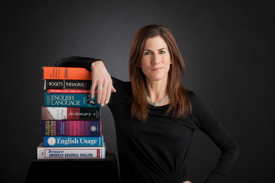Politically Correct: Do Our Language Choices Matter?
Anne Curzan
Thursday, 13 Apr 2017 at 7:00 pm – Sun Room, Memorial Union
Anne Curzan is Associate Dean for Humanities and Arthur F. Thurnau Professor of English at the University of Michigan and author of Gender Shifts in the History of English. She will discuss to what extent social attitudes shape language - or if language has the power to change social attitudes. Her talk focuses on words we use every day that have been the focus of conscious efforts to promote a more inclusive and equitable language. Curzan discusses trends in the English language in a weekly segment on Michigan Radio and contributes regularly to The Chronicle of Higher Education's Lingua Franca blog on language and writing in academe. Quentin Johnson Lecture in LinguisticsAnne Curzan also holds appointments in linguistics and the School of Education at the University of Michigan. She earned a BA in Linguistics from Yale University and an MA and a PhD in English Language and Literature from the University of Michigan. She has filmed a 36-lecture course called "The Secret Life of Words," for The Great Courses. Her other publications include Fixing English: Prescriptivism and Language Change and How English Works: A Linguistic Introduction.
About the talk
Politically correct, or “PC†language has acquired negative connotations over the years: it is sometimes dismissed as “silly†or as “threatening†or as not really addressing the underlying social issues. Yet we probably all agree that at the most fundamental level, language matters. Words may not break our bones, but they have great power and can do real harm. So does that mean that every language choice we make, no matter how small and how local, matters? This talk will focus on words we use every day that have been the focus of conscious language reform efforts to promote a more inclusive and equitable language. Examples include "he" versus "her or she" versus "they" or "gay" versus "homosexual." To what extent do social attitudes shape language - or is it that language has the power to change social attitudes? It’s a difficult question but an important one for all of us to consider as speakers and writers.
Cosponsored By:
- Linguistics Program
- Committee on Lectures (funded by Student Government)
Stay for the entire event, including the brief question-and-answer session that follows the formal presentation. Most events run 75 minutes.
Sign-ins are after the event concludes. For lectures in the Memorial Union, go to the information desk in the Main Lounge. In other academic buildings, look for signage outside the auditorium.
Lecture Etiquette
- Stay for the entire lecture and the brief audience Q&A. If a student needs to leave early, he or she should sit near the back and exit discreetly.
- Do not bring food or uncovered drinks into the lecture.
- Check with Lectures staff before taking photographs or recording any portion of the event. There are often restrictions. Cell phones, tablets and laptops may be used to take notes or for class assignments.
- Keep questions or comments brief and concise to allow as many as possible.



